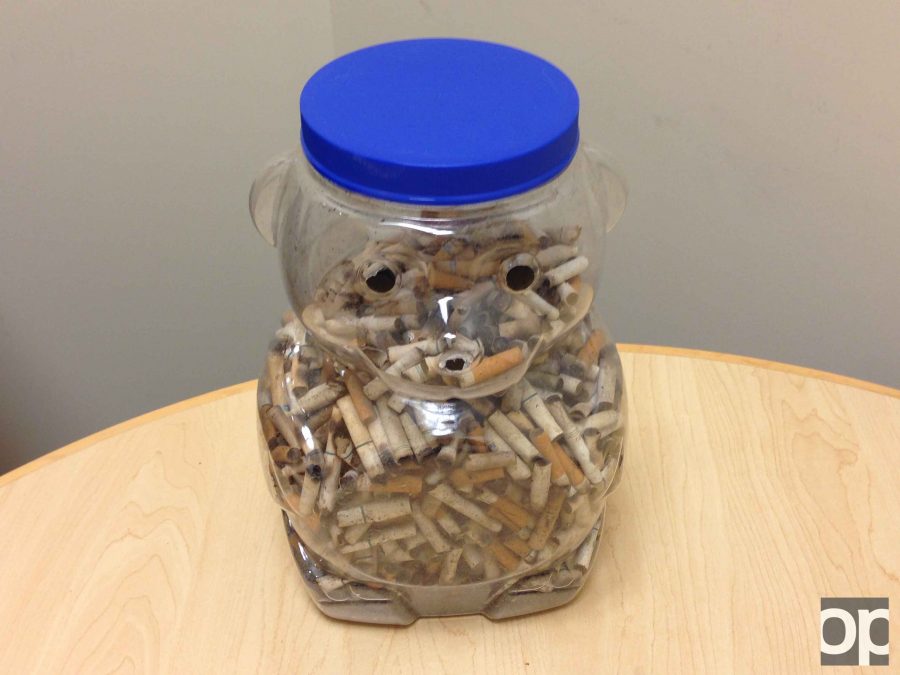Millennials could be the generation to end smoking
Health and Wellness Coordinator Erica Wallace collected used cigarettes around campus within an hour that almost filled up the bear jar on her desk.
According to the Centers for Disease Control and Prevention (CDC), 5.6 million of today’s Americans who are younger than 18 will die early from a smoking-related illness if smoking continues at the current rate among youth in the U.S.
The Truth Initiative, the nation’s largest nonprofit public health organization devoted to ending tobacco usage, has stated that millennials could be the generation to end smoking based on statistics from the University of Michigan’s Monitoring the Future, which state that cigarette smoking among youth is down to 7 percent as of 2015.
“Our goal is to inspire youth and young adults to use their creativity and social influence to spread the truth about tobacco and make this the generation that ends tobacco use,” said Cas Marburger, social media manager for the Truth Initiative.
There are multiple factors that could contribute to this claim proving true, such as those pertaining to finances.
“Our latest ads focused on the fact that smokers earn 20 percent less than nonsmokers,” Marburger said. “Earn. Not spend, which is crazy, because smokers are obviously also spending money on tobacco products that nonsmokers aren’t spending.”
Improved education on the physical health risks attached to tobacco use could be associated with millennials’ judgement as well.
According to director of Oakland University’s Graham Health Center, Nancy Jansen, the leading sickness caused by smoking is lung cancer, followed by heart disease and chronic obstructive pulmonary disease (COPD).
As of 2010, 26 states had banned smoking from worksites, restaurants and bars, as well as an additional 10 states prohibiting it from one or two of those places.
The CDC reported that infants who experience secondhand smoke have a greater risk of sudden infant death syndrome (SIDS), while other studies have shown that pets may be more susceptible to secondhand smoke than humans due to their grooming behaviors.Many people, such as Associate Professor of Psychology Keith Williams, who specializes in addiction and pharmacology, feel that while millennials have the potential to end cigarette smoking, nicotine itself does not seem to be on the way out.
Young adults who use tobacco seem to be gravitating toward both hookah and vaping (e-cigarettes), though those could hardly be considered much healthier than cigarettes.
According to the Truth Initiative, a 60-minute hookah session is as harmful as smoking 100 cigarettes.
As for vaping, the argument could be made that since users vape pure nicotine, it may be somewhat safer. However, it still has harmful effects on the heart, according to Cleveland Clinic.
“We know e-cigarettes are less harmful than traditional cigarettes, but that doesn’t mean people who don’t smoke should start using them,” Marburger said. “Nicotine is addictive, and regulation of these products is still in the early stages.”
As for those who wish to quit, the belief that nicotine withdrawal can put the person at risk of death, like withdrawal from some stronger narcotics, is false, Jansen said.
Medications such as Zyban and varenicline (Chantix) exist to aid against cravings, as well as Nicotine Replacement Therapy in the form of a patch or gum.
Quit Kits are available for free at Graham Health Center and the OU Rec Center.
OU also offers group Freedom From Smoking classes, and suggests online resources such as the apps Livestrong: My Quit Coach and Smokefree QuitGuide.
“We want to focus on this age because if we can stop or deter someone from smoking now, the chances of them not smoking later in life are going to be significant,” Health and Wellness Coordinator Erica Wallace said.
OU is one of 20 colleges that have recently been given a $20,000 Tobacco-Free Generation Initiative grant, which works toward making millennials the generation to end smoking. The grant is from a partnership with the American Cancer Society and the CVS Health Foundation.
As a result of this, OU’s new campaign “Project Clean Air for the Bear” was announced on Monday, Nov. 14 as a way to gain a 100 percent smoke-free campus through education.
“Big Tobacco is constantly evolving their game plan,” Marburger said. “We need to constantly evolve ours. We are a generation with new beliefs and new ideas. Together, we are bigger, louder and more powerful than Big Tobacco.”








